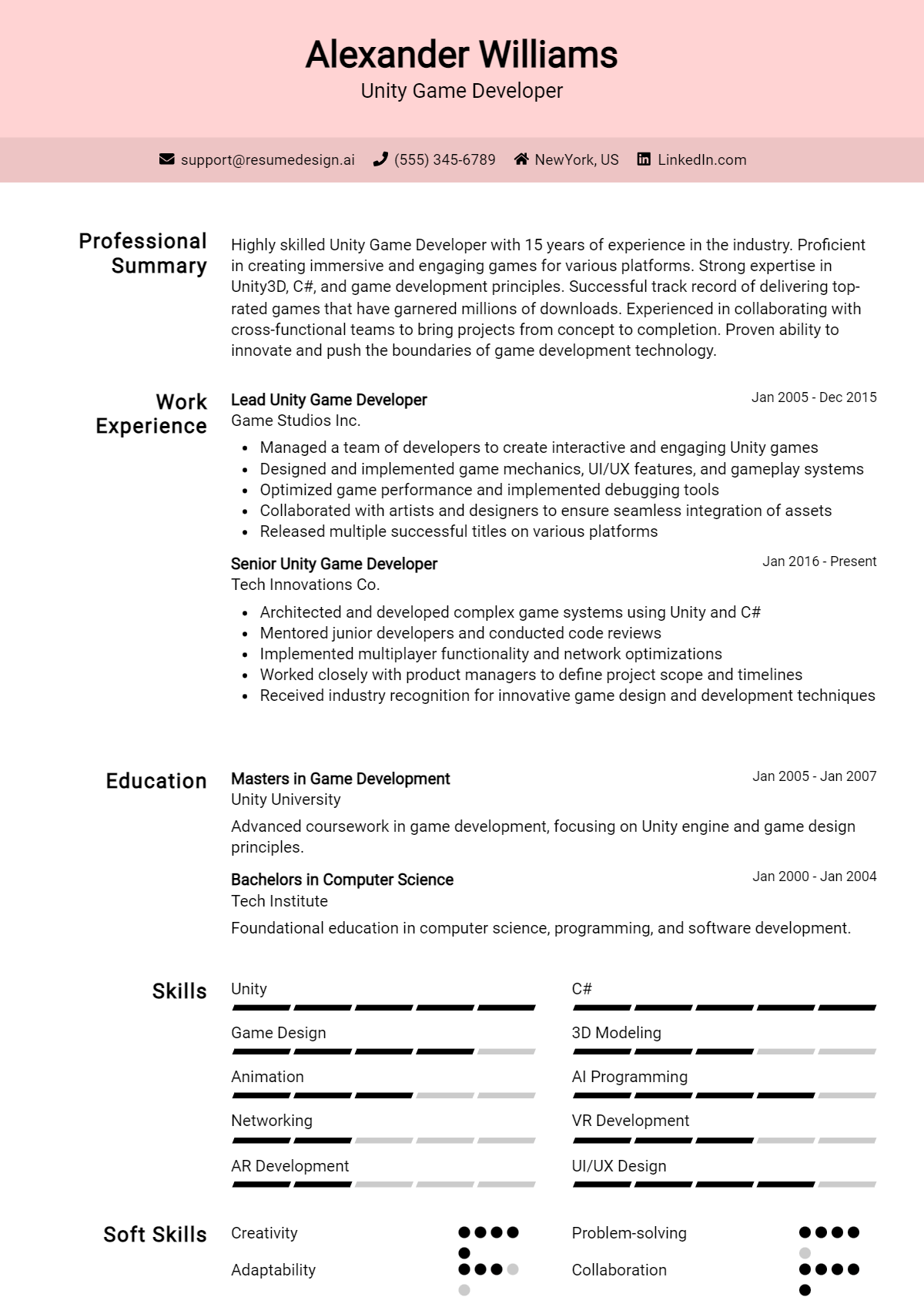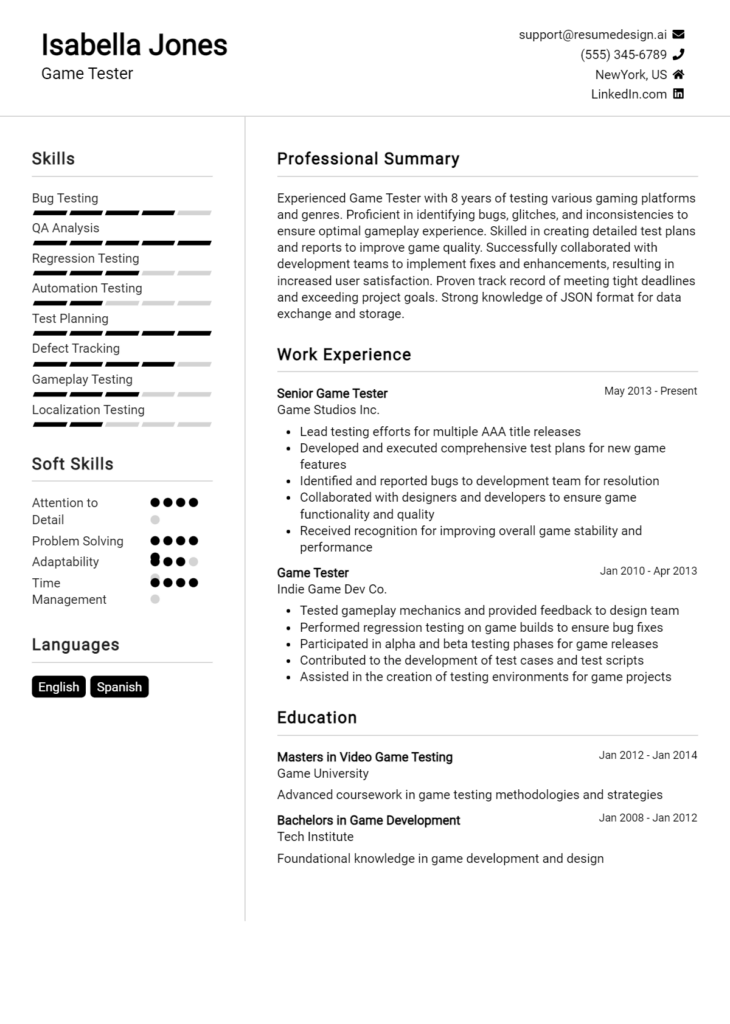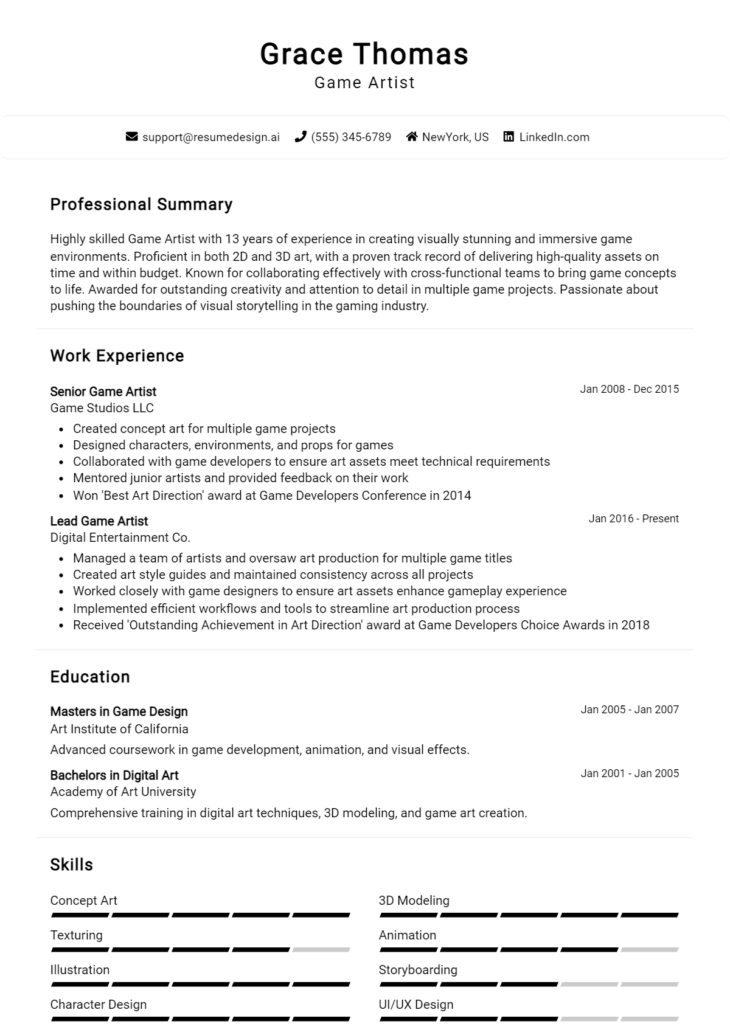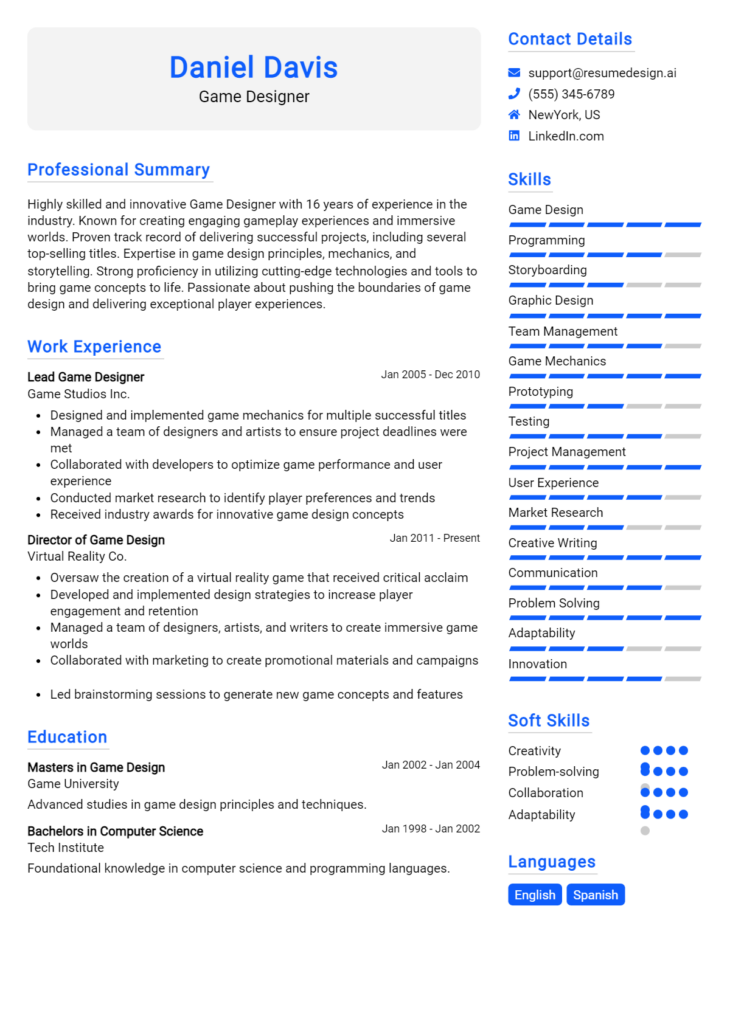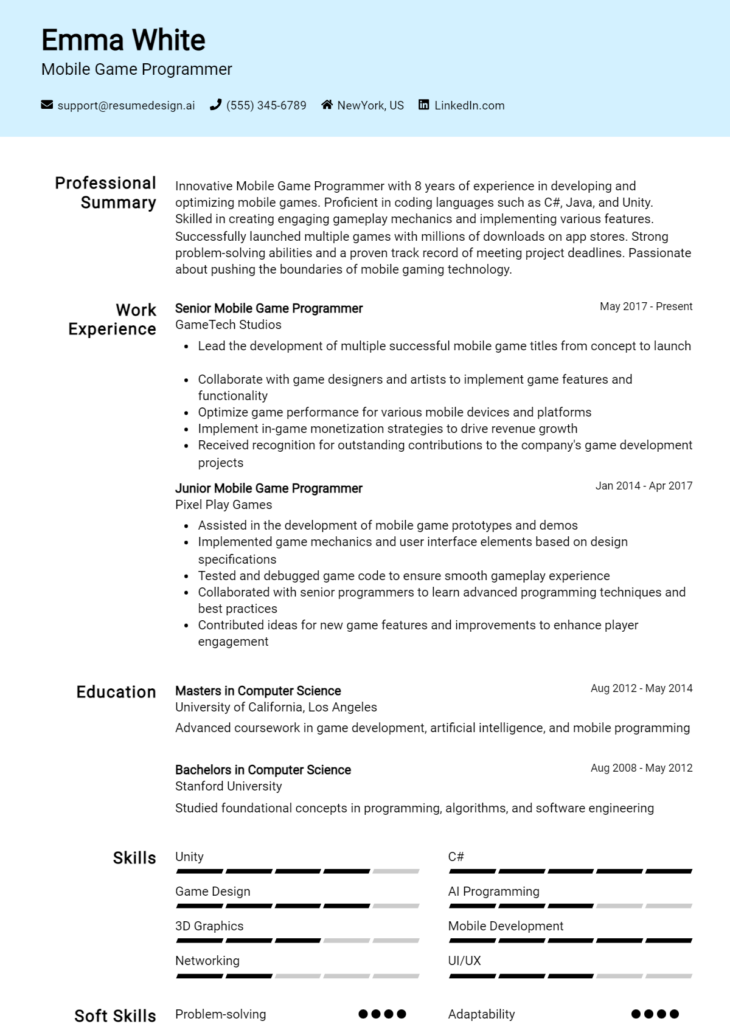Unity Game Developer Core Responsibilities
A Unity Game Developer is responsible for designing, developing, and optimizing interactive experiences using the Unity engine. This role requires strong technical skills in programming languages like C# and a solid understanding of game mechanics and physics. Unity Developers collaborate with artists, designers, and sound engineers, bridging gaps between departments to ensure cohesive gameplay. Problem-solving abilities are crucial, as they address technical challenges, contributing significantly to the organization’s goals. A well-structured resume highlighting these skills can effectively showcase their qualifications.
Common Responsibilities Listed on Unity Game Developer Resume
- Develop and implement game mechanics using Unity and C#
- Collaborate with cross-functional teams to define game features
- Optimize game performance for various platforms
- Debug and troubleshoot issues in the game code
- Create and maintain documentation for game development processes
- Participate in design reviews and provide technical feedback
- Integrate audio, graphics, and animations into the game
- Stay updated with industry trends and Unity updates
- Conduct playtesting and gather user feedback for improvements
- Assist in project planning and timeline estimation
- Maintain version control using tools like Git
- Mentor junior developers and provide guidance on best practices
High-Level Resume Tips for Unity Game Developer Professionals
A well-crafted resume is crucial for Unity Game Developer professionals, as it serves as the first impression a candidate makes on potential employers. In a competitive job market, your resume needs to effectively showcase not only your technical skills but also your achievements and experiences that set you apart from other candidates. A compelling resume can open doors to interviews and opportunities, making it essential to present a polished and tailored document that aligns with the specific requirements of the job you're applying for. This guide will provide practical and actionable resume tips specifically tailored for Unity Game Developer professionals, helping you stand out in the game development industry.
Top Resume Tips for Unity Game Developer Professionals
- Tailor your resume to the specific job description by incorporating relevant keywords and phrases.
- Highlight your experience with Unity and other game development tools, emphasizing projects you've worked on.
- Quantify your achievements with metrics, such as the number of downloads for a game or improvements in performance.
- Showcase your portfolio with links to playable demos or videos of your projects to provide evidence of your skills.
- Include both technical skills (e.g., C#, 3D modeling, AI programming) and soft skills (e.g., teamwork, problem-solving) relevant to game development.
- Utilize a clean and visually appealing layout that enhances readability and highlights key information.
- Incorporate any relevant certifications or training that demonstrate your commitment to professional development.
- List any experience working in diverse teams or collaborating with artists, designers, and other developers.
- Keep your resume concise, ideally one page, focusing on the most relevant and impactful information.
- Proofread for errors and ensure consistent formatting to present a professional image.
By implementing these tips, you can significantly increase your chances of landing a job in the Unity Game Developer field. A well-structured and targeted resume not only showcases your qualifications but also demonstrates your attention to detail and commitment to your craft, making a positive impression on potential employers.
Why Resume Headlines & Titles are Important for Unity Game Developer
In the competitive field of game development, a Unity Game Developer's resume must stand out to capture the attention of hiring managers. A well-crafted resume headline or title serves as the first impression, summarizing a candidate's key qualifications in a concise and impactful manner. This critical element not only grabs the reader's attention but also sets the tone for the rest of the resume. A strong headline should be relevant to the specific job being applied for, highlighting essential skills and experiences that align with the employer's needs.
Best Practices for Crafting Resume Headlines for Unity Game Developer
- Keep it concise: Aim for one impactful phrase that summarizes your expertise.
- Be specific: Tailor your headline to reflect the role you are applying for.
- Highlight key skills: Include relevant technical skills or software proficiencies.
- Showcase experience: Mention years of experience or noteworthy projects.
- Incorporate keywords: Use industry-related terms that resonate with the job description.
- Avoid jargon: Keep the language clear and easily understood by all readers.
- Emphasize achievements: If possible, include a quantifiable accomplishment.
- Maintain professionalism: Ensure your tone is suitable for a professional context.
Example Resume Headlines for Unity Game Developer
Strong Resume Headlines
"Creative Unity Game Developer with 5 Years of Experience in Immersive Game Design"
"Skilled Unity Developer Specializing in Cross-Platform Game Development and VR Integration"
“Results-Driven Unity Game Developer with Proven Track Record of Successful Game Launches”
“Passionate Unity Developer with Expertise in AI-Driven Game Mechanics and User Engagement”
Weak Resume Headlines
“Unity Developer”
“Game Developer Looking for Opportunities”
“Professional in Game Development”
Strong headlines are effective because they immediately convey a candidate's unique qualifications and strengths relevant to the specific role. They provide a clear snapshot of what the applicant brings to the table, making it easier for hiring managers to see their value. In contrast, weak headlines tend to be vague and non-specific, lacking the detail necessary to differentiate the candidate from others. This makes them less memorable and less compelling, ultimately leading to missed opportunities in a crowded job market.
Writing an Exceptional Unity Game Developer Resume Summary
A well-crafted resume summary is crucial for a Unity Game Developer as it serves as the first impression for hiring managers. In a competitive job market, a strong summary quickly captures attention by showcasing key skills, experience, and accomplishments relevant to the role. It provides a concise snapshot of the candidate's qualifications, making it easier for employers to assess fit for the position. Tailored specifically to the job being applied for, an impactful summary can set the tone for the rest of the resume, highlighting the candidate's unique strengths and aligning them with the needs of the organization.
Best Practices for Writing a Unity Game Developer Resume Summary
- Quantify achievements to demonstrate impact (e.g., "increased game performance by 30%").
- Highlight relevant skills such as C#, Unity3D, and game design principles.
- Tailor the summary to reflect the specific job description and requirements.
- Keep it concise, ideally between 3-5 sentences.
- Use action verbs and strong language to convey confidence and expertise.
- Focus on unique contributions to previous projects or teams.
- Showcase familiarity with industry standards and best practices.
- Include soft skills that are relevant, such as teamwork and communication abilities.
Example Unity Game Developer Resume Summaries
Strong Resume Summaries
Dynamic Unity Game Developer with over 5 years of experience in creating engaging multiplayer experiences, successfully launching 3 top-rated games that collectively garnered over 1 million downloads. Proficient in C# and Unity3D, with a proven track record of optimizing game performance by 35%, enhancing user engagement through innovative gameplay mechanics.
Results-driven Unity Developer with expertise in AR/VR applications and a strong background in game design. Developed and published an award-winning mobile game that achieved a 4.8-star rating on the App Store, while increasing user retention by 40% through data-driven adjustments and user feedback.
Creative Game Developer specializing in 2D and 3D game development, with a solid foundation in physics-based gameplay. Led a team to design and implement an interactive puzzle game that received recognition in the Indie Game Festival, achieving over 100,000 active users within the first month of launch.
Weak Resume Summaries
Unity Developer with some experience in game development. I have worked on various projects and have a good understanding of Unity.
Passionate about making games and learning new technologies. I am looking for a job in game development where I can use my skills.
The strong resume summaries stand out due to their specificity, quantifiable achievements, and direct alignment with the role of a Unity Game Developer. They clearly communicate the candidate's impact, skills, and relevant experience, making them attractive to hiring managers. In contrast, the weak summaries lack detail and specificity, failing to highlight any measurable outcomes or unique qualifications, making them less compelling and memorable to employers.
Work Experience Section for Unity Game Developer Resume
The work experience section of a Unity Game Developer resume is crucial as it serves as a detailed narrative of the candidate's career journey, demonstrating their technical skills, project management abilities, and capacity to deliver high-quality products. This section highlights how a candidate has applied their knowledge in real-world scenarios, showcasing their proficiency in Unity and their understanding of game development processes. By quantifying achievements and aligning experiences with industry standards, candidates can effectively communicate their value to potential employers, making it essential to craft this section with precision and clarity.
Best Practices for Unity Game Developer Work Experience
- Use specific job titles and project names to enhance credibility.
- Quantify achievements with metrics, such as user engagement rates or revenue generated.
- Highlight technical skills relevant to Unity development, such as C#, shader programming, or VR integration.
- Showcase collaborative efforts by detailing team roles and contributions to group projects.
- Include problem-solving examples that demonstrate innovation and creativity.
- Tailor your experiences to align with the job description of the position you are applying for.
- Use action verbs to convey a proactive approach to work tasks and responsibilities.
- Keep descriptions concise yet informative, focusing on the impact of your work.
Example Work Experiences for Unity Game Developer
Strong Experiences
- Led a team of 5 developers in creating a multiplayer game that achieved over 100,000 downloads in the first month, increasing company revenue by 30%.
- Developed and optimized a game engine feature that improved frame rates by 40%, enhancing user experience and reducing bounce rates.
- Collaborated with artists and designers to create a visually stunning 3D environment, resulting in a 50% increase in user engagement based on feedback.
- Managed the full lifecycle of a VR project from concept to launch, successfully delivering the product ahead of schedule and under budget.
Weak Experiences
- Worked on various game projects without specifying roles or contributions.
- Assisted in development tasks as needed.
- Participated in team meetings and contributed ideas.
- Helped fix bugs in different games during my time at the company.
The examples of strong experiences are considered effective because they clearly outline quantifiable results, indicate leadership and collaboration, and demonstrate specific technical contributions to projects. In contrast, the weak experiences lack specificity and measurable outcomes, making them less impactful and failing to convey the candidate's true abilities or contributions to potential employers.
Education and Certifications Section for Unity Game Developer Resume
The education and certifications section of a Unity Game Developer resume is crucial in showcasing a candidate's academic background, industry-relevant certifications, and commitment to continuous learning. This section not only provides potential employers with insight into the applicant's foundational knowledge but also highlights specialized training that aligns with the responsibilities of game development. By including relevant coursework and certifications, candidates can significantly enhance their credibility, demonstrating both their technical capabilities and dedication to staying current in a rapidly evolving industry.
Best Practices for Unity Game Developer Education and Certifications
- List degrees and certifications that are directly relevant to game development and Unity.
- Include specific coursework that demonstrates proficiency in game design, programming, and computer graphics.
- Highlight industry-recognized certifications, such as Unity Certified Developer, to differentiate yourself from other candidates.
- Use clear formatting to make this section easy to read and navigate for hiring managers.
- Provide the date of completion for each qualification to show your most recent learning efforts.
- Emphasize any specialized training or workshops that focus on Unity or emerging game development technologies.
- Keep descriptions concise yet informative, focusing on skills gained that are applicable to the job role.
- Regularly update this section to reflect new certifications or courses completed, ensuring relevance.
Example Education and Certifications for Unity Game Developer
Strong Examples
- Bachelor of Science in Computer Science, University of XYZ, 2021
- Unity Certified Developer, 2023
- Certificate in Game Design and Development, ABC Institute, 2022
- Coursework: Advanced Game Programming, 3D Graphics, and Artificial Intelligence for Games
Weak Examples
- Associate Degree in General Studies, Community College, 2019
- Certification in Basic Computer Skills, 2020
- Online Course: Introduction to Photoshop, 2021
- High School Diploma, 2015
The strong examples are considered effective because they directly relate to the skills and knowledge required for a Unity Game Developer, showcasing a relevant degree, recognized certifications, and pertinent coursework. In contrast, the weak examples highlight qualifications that lack direct relevance to game development, such as general studies or basic computer skills, which do not contribute to the candidate's ability to excel in a Unity-focused role.
Top Skills & Keywords for Unity Game Developer Resume
As a Unity Game Developer, showcasing the right skills on your resume is crucial for capturing the attention of potential employers. Your skills not only demonstrate your technical abilities and understanding of game development processes but also reflect your capacity for collaboration and problem-solving within a team. A well-crafted resume highlights both hard and soft skills, providing a balanced view of your qualifications. By emphasizing relevant skills, you increase your chances of landing interviews and securing positions in this competitive field. For more guidance on how to format your resume effectively, consider exploring resources on skills and work experience.
Top Hard & Soft Skills for Unity Game Developer
Soft Skills
- Problem-Solving
- Communication
- Teamwork
- Adaptability
- Creativity
- Attention to Detail
- Time Management
- Critical Thinking
- Collaboration
- Passion for Gaming
Hard Skills
- Proficiency in C# Programming
- Unity Engine Expertise
- Game Design Principles
- 3D Modeling and Animation
- Physics Simulation
- Version Control Systems (e.g., Git)
- Mobile Game Development
- UI/UX Design
- Shader Programming
- Performance Optimization Techniques
- VR/AR Development
- Asset Management
- Scripting and Automation
- Multiplayer Networking
- Debugging and Testing Techniques
Stand Out with a Winning Unity Game Developer Cover Letter
Dear Hiring Manager,
I am excited to apply for the Unity Game Developer position at [Company Name], as advertised on [Job Board/Company Website]. With a strong background in computer science and over [X years] of hands-on experience in game development using Unity, I have honed my skills in creating immersive and engaging gaming experiences. My passion for gaming, combined with my technical expertise, allows me to contribute effectively to your team and bring innovative ideas to life.
Throughout my career, I have successfully completed multiple projects, including [mention any notable projects or games you have worked on], which not only enhanced my proficiency in C# programming but also deepened my understanding of game mechanics, physics, and user interface design. I am particularly skilled in optimizing game performance, debugging complex issues, and collaborating with artists and designers to ensure a seamless integration of visual and functional elements. My proficiency in version control systems like Git and my familiarity with Agile methodologies have equipped me to work efficiently in dynamic team environments.
I am particularly drawn to [Company Name] because of your commitment to [mention any specific aspect of the company’s culture or projects that attracts you]. I am eager to bring my unique blend of creativity and technical skills to your team, contributing to the development of captivating games that resonate with players. I am excited about the opportunity to collaborate with fellow developers, share my knowledge, and continue to grow within a forward-thinking company.
Thank you for considering my application. I look forward to the possibility of discussing how my background, skills, and enthusiasms align with the needs of your team. I am confident that my dedication and passion for game development will make me a valuable addition to [Company Name].
Sincerely,
[Your Name]
[Your LinkedIn Profile or Portfolio]
[Your Contact Information]
Common Mistakes to Avoid in a Unity Game Developer Resume
When crafting a resume as a Unity Game Developer, it's crucial to present your skills and experience in a way that stands out to potential employers. However, many applicants make common mistakes that can undermine their chances of landing an interview. By being aware of these pitfalls, you can refine your resume and better showcase your qualifications. Here are some frequent errors to avoid:
Generic Objective Statements: Using a vague or generic objective can make your resume blend in with others. Instead, tailor your objective to reflect your specific goals and align them with the position you're applying for.
Lack of Relevant Skills: Failing to highlight relevant programming languages, tools, and technologies specific to Unity can lead to missed opportunities. Make sure to include skills like C#, shader programming, and version control systems.
Overly Complex Language: Using jargon or overly complex terminology can confuse hiring managers. Aim for clarity and simplicity in your descriptions to ensure your qualifications are easily understood.
Ignoring Portfolio Links: Not including a link to your portfolio or showcasing your projects can be a significant oversight. A well-curated portfolio demonstrates your practical experience and creativity, which is essential in game development.
Inadequate Project Descriptions: Simply listing your past jobs without detailing your specific contributions can make your experience feel less impactful. Use bullet points to describe your role in projects, the technologies you used, and the results achieved.
Typos and Grammatical Errors: Spelling and grammatical mistakes can create a negative impression and suggest a lack of attention to detail. Always proofread your resume or have someone else review it before submission.
Lack of Soft Skills: Focusing solely on technical skills while neglecting soft skills like teamwork, communication, and problem-solving can hinder your resume. Game development often requires collaboration, so highlight your ability to work well with others.
Not Tailoring Your Resume: Using the same resume for every application can demonstrate a lack of effort. Customize your resume for each position to emphasize the experiences and skills that are most relevant to the job description.
Conclusion
In summary, a Unity Game Developer plays a crucial role in the gaming industry, combining creativity with technical skills to create immersive gaming experiences. Key competencies include proficiency in C# programming, a solid understanding of game mechanics, and experience with the Unity engine. Developers should also be adept at working within teams and possess problem-solving abilities to troubleshoot and optimize game performance.
As you reflect on your qualifications and experiences as a Unity Game Developer, it's essential to ensure that your resume effectively showcases your skills. A well-structured resume can significantly improve your chances of landing your dream job in this competitive field.
Take action now by reviewing and updating your Unity Game Developer resume. You can enhance your application by utilizing various resources such as resume templates, which offer professionally designed structures to highlight your accomplishments. Additionally, consider using a resume builder that simplifies the process of creating a polished and tailored resume.
Don’t forget to check out resume examples to inspire your content and format, ensuring your document stands out. Lastly, pairing your resume with a compelling cover letter template can further elevate your application, providing a personal touch that showcases your passion for game development.
Now is the time to take the next step in your career journey—revise your resume and utilize these valuable tools to make a lasting impression!

